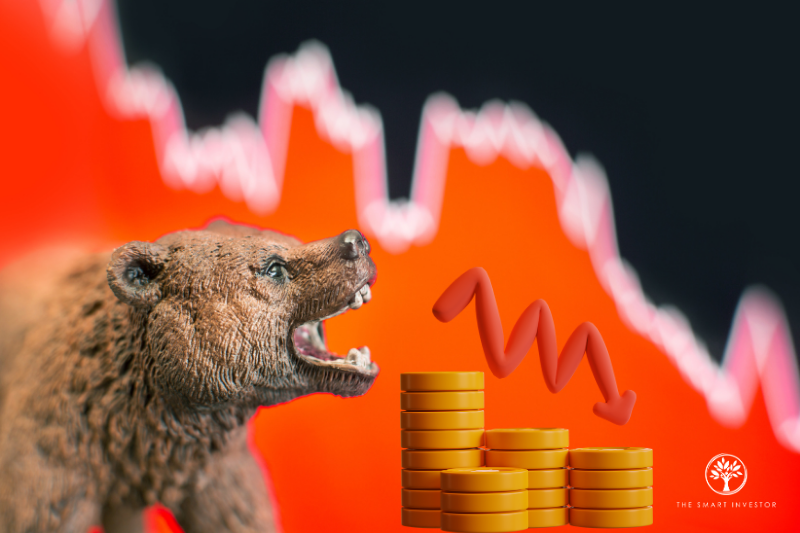Singapore Stocks Suffered a Bloodbath Last Friday: How Should Investors React?
Singapore Stock
2025-04-10 14:30:51
2.59W
The Straits Times Index shrivelled 3% after Trump enacted a wide range of tariffs in the ongoing trade war.

A wide range of casualties
The three local banks bore the brunt of the sell-off.DBS Group (SGX: D05) tumbled nearly 4.9% to S$43.30 while United Overseas Bank (SGX: U11) fell 3.9% to S$35.46.OCBC Ltd (SGX: O39) saw its share price slide 2.8% to S$16.62.Shipbuilders, which are highly exposed to global trade, also slumped in tandem with the bellwether blue-chip index’s decline.Nam Cheong (SGX: 1MZ), a marine group specialising in the construction of offshore support vessels, saw its share price plunge 8.4% to S$0.53.Yangzijiang Shipbuilding (SGX: BS6) slid 4% to S$2.17 while Seatrium (SGX: 5E2) fell 3% to S$1.94.Although semiconductors were spared from the tariffs for now, analysts believe that the sector could be subject to another round of tariffs for specific products.AEM Holdings (SGX: AWX) tumbled 3.1% to S$1.24 while UMS Integration (SGX: 558) saw its share price decline 2.8% to S$1.03.Fast-growing companies such as iFAST Corporation (SGX: AIY) were not spared from the carnage.The fintech saw its share price fall 4.1% to S$6.93 as investors fret over the pace of inflows following the comprehensive tariff announcement.With the US market suffering a second day of selling as China announced retaliatory tariffs of 34% on all US imports, Singapore could be in for another bout of selling when the markets open on Monday.Uncertainty reigns
The latest, and thus far most comprehensive, salvo from Trump seeks to upend years of free trade.It’s still early days as countries reel from the impact of these punishing tariffs.Supply chains will be impacted and companies need time to assess the impact of these additional taxes.These tariffs are sure to increase the cost of production and distribution and cause significant disruption to many businesses’ plans.There is also significant uncertainty as to how each country will respond to these tariffs, which are set to take effect on 9 April.Larger economies may choose to retaliate the slam the US with its own set of tariffs while smaller nations may choose to negotiate and broker a different arrangement.Trump says he is “open to negotiations”, signalling that these tariffs are not final and could be used as a bargaining tool for the US to gain the upper hand.No one knows what the next move will be for the notoriously unpredictable Trump, but investors are fearing a worst-case scenario where a widening trade war may trigger a global recession.Be calm and monitor what companies say
In situations like these, it’s recommended that investors keep a level head and continue to monitor and assess the developments.While fear and panic are natural emotions that you will experience in the face of growing uncertainty, the last thing you want to do is to sell all your stocks.Remember to check your investment thesis as to why you purchased these stocks in the first place.Companies with strong brands, sturdy business models and pricing power should eventually rise above these tariffs and stand tall above their competition.Yes, there will be a lot of short-term pain as companies react and adjust to the new reality of a possible trade war.But what you, as an investor, should do is carefully monitor companies’ commentaries to see how they are coping with the tariffs and the strategies they intend to use to mitigate their impact.Get Smart: A different type of crisis
Stock markets go through various types of crises regularly.There was the global financial crisis back in 2008-2009 which was triggered by sub-prime mortgages.More recently, the pandemic also triggered a bear market as uncertainty reigned in 2020 over whether the COVID-19 virus could decimate the population.Throughout these crises, the market plunged and then recovered as strong companies continued to soldier on.Trump’s tariffs are turning out to be a different type of crisis.As investors, you should keep calm, assess the situation, and continue to monitor the companies within your portfolio.With patience and tenacity, you can get through this crisis, just like how the previous ones were eventually resolved.First-time investors: We’ve finally released our beginner’s guide to investing. Read it in an afternoon, follow the principles, pick an investing style and buy your first SGX stocks within the next few hours! Click here to download it for free.Follow us on Facebook and Telegram for the latest investing news and analyses!Disclosure: Royston Yang owns shares of DBS Group and iFAST Corporation.Disclaimer: The views in this article are from the original Creator and do not represent the views or position of Hawk Insight. The content of the article is for reference, communication and learning only, and does not constitute investment advice. If it involves copyright issues, please contact us for deletion.